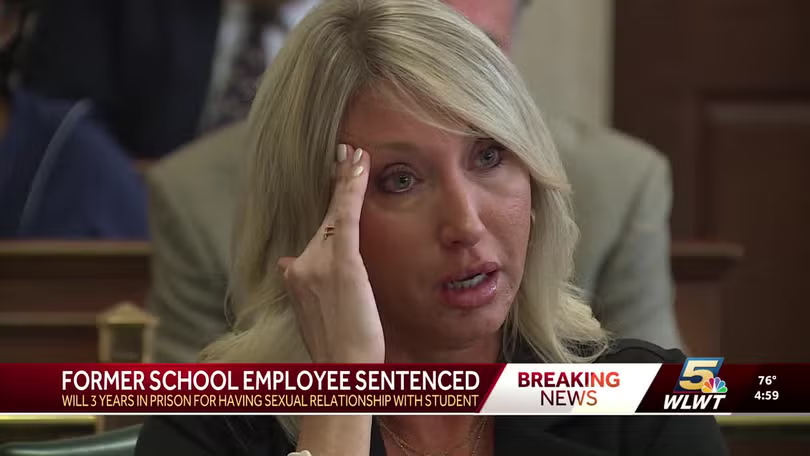Ohio Catholic School Teacher Sentenced to Prison for Sexual Relationship with Student

Ohio Catholic School Teacher Sentenced to Prison for Sexual Relationship with Student
Introduction
In a distressing case that has captured public attention, Emily Nutley, a former teacher at an Ohio Catholic school, has been sentenced to three years in prison for engaging in a sexual relationship with a teenage student. This incident underscores the significant challenges and responsibilities associated with maintaining ethical standards in educational institutions. Such actions not only breach the trust of students and parents but also raise profound questions about power dynamics in teacher-student relationships.
The court’s decision to impose a three-year prison term for Nutley reflects the severity of her actions. The relationship, which involved a significant age difference and a position of authority, exemplifies a betrayal of the professional responsibilities entrusted to educators. This case highlights the critical need for stringent measures to safeguard students and ensure that schools remain safe environments conducive to learning.
In today’s society, the ramifications of such incidents can extend far beyond the individuals involved. They can lead to broader discussions regarding the adequacy of safeguarding policies and the training provided to educational staff in recognizing and acting against inappropriate conduct. The emotional and psychological impact on the victim and their family must also be considered, as such experiences can have long-lasting effects on their well-being and educational prospects.
Furthermore, cases like this one prompt a reevaluation of the systems in place to protect students from predatory behavior. Schools are mandated to uphold high ethical standards, and the failure to do so can have devastating consequences not only for the victims but also for the institution and the wider community. As such, the sentencing of Emily Nutley serves as a stark reminder of the imperative to maintain integrity within educational settings.
Background of the Case
The case involving Emily Nutley, a teacher at a Catholic school in Ohio, has captured public attention due to its serious implications and unsettling nature. Emily Nutley was employed as a teacher at a local parochial school, where she was highly regarded for her dedication to educating young minds. However, the professional environment soon became overshadowed by allegations surrounding her conduct with a student.
The matter came to light when suspicions were raised by concerned individuals within the community. Reports indicated that fellow faculty members and students became aware of the interactions, prompting an investigation into Nutley’s behavior. As the inquiry progressed, law enforcement authorities were involved, which further escalated the situation. During the investigation, it was revealed that the teacher had engaged in multiple illicit encounters with the student, leading to her eventual arrest.
Legal Proceedings
Following the arrest of the Ohio Catholic school teacher, the legal proceedings commenced promptly, drawing significant media attention due to the serious nature of the allegations. The teacher, identified as Nutley, faced charges related to her involvement in a sexual relationship with a student, which led to her being indicted on multiple counts, including sexual battery. The gravity of these charges necessitated a thorough judicial process, ensuring proper legal representation and due process rights were upheld throughout.
During the court hearings, Nutley entered a guilty plea to two counts of sexual battery. This decision aimed to expedite the legal process while acknowledging the facts as presented by the prosecution. The court’s proceedings were marked by statements from both the prosecution and defense, highlighting the complex emotions surrounding the case. The district attorney emphasized the need for accountability and the impact of Nutley’s actions on the victim, stressing the importance of protecting students from such predatory behavior. In contrast, the defense focused on mitigating circumstances, suggesting that Nutley recognized the repercussions of her actions and expressed remorse.
Several factors influenced the sentencing decision, including the age of the victim, the nature of the relationship, and Nutley’s role as an educator. The judge weighed the testimonies and evidence presented, considering both the harm inflicted upon the student and the broader implications for the educational community. Ultimately, this case serves as a poignant reminder of the responsibility educators carry to maintain professional boundaries and the legal ramifications that arise when those boundaries are crossed. As the judicial process unfolded, it became evident that such actions are met with unwavering scrutiny and significant legal consequences.
Sentencing Details
In a recent case that has garnered significant public attention, the teacher from Ohio, identified as Nutley, was sentenced to serve a substantial prison term due to his conviction on multiple counts of sexual battery involving a student. Specifically, the court imposed a three-year prison sentence for each count of sexual battery, totaling a significant period of incarceration. However, it is important to note that these sentences will be served concurrently. This means that Nutley will ultimately be serving a single three-year term, rather than six years, which would have been the case if the sentences were to run consecutively.
The decision to impose a concurrent sentence reflects the court’s consideration of the circumstances surrounding the offenses, including Nutley’s age, prior criminal history, and the impact of the crimes on the victim. In addition to the prison time, the court may also have mandated certain rehabilitative measures, which could include counseling and participation in programs aimed at preventing future offenses. Furthermore, upon release, Nutley may be subjected to strict monitoring requirements, including registration as a sex offender, which will have a lasting impact on his life and ability to work in any capacity involving minors.
This sentencing serves as a critical reminder of the serious nature of sexual offenses, particularly when they involve positions of authority, such as that of a teacher. The implications extend beyond the individual sentenced; they raise broader questions concerning safety and trust within educational environments. As the court emphasized during sentencing, these crimes not only affect individual victims but also cast a shadow on the integrity of educational institutions. Moving forward, the emphasis will likely remain on enhancing safety protocols to protect students from similar predatory behavior in schools.
Consequences for Nutley
Emily Nutley, a former teacher at a Catholic school in Ohio, has been sentenced to prison following her conviction for engaging in a sexual relationship with a student. This grave act has irrevocably altered not only her immediate situation but also her long-term future. One of the most significant consequences Nutley will face is her classification as a tier 3 sex offender. This designation, which is applied to individuals who have committed severe sexual offenses, mandates her to register with the state’s sex offender registry for the remainder of her life.
The implications of being a tier 3 sex offender are far-reaching. Nutley will be required to report regularly to law enforcement, provide updates on her personal information, and adhere to stringent regulations regarding her residence and employment. Such restrictions can severely limit her opportunities for housing and employment, as many employers conduct background checks and may disqualify applicants based on their criminal history. In addition, any violation of these registration requirements could lead to further legal consequences, including additional prison time.
Beyond the legal ramifications, Nutley’s personal life will likely be adversely affected. The stigma associated with being a sex offender is significant and can lead to social ostracism and strained relationships with family and friends. This isolation could have profound effects on her mental health, as support systems may dwindle in the wake of her conviction and public scrutiny. Moreover, reinstating her career in education or any related field appears unlikely, as the trust and professionalism expected of educators will be compromised by her actions.
Overall, Emily Nutley’s choices have set into motion a series of events that will impact her for years to come, both personally and professionally. The consequences of her actions serve as a stark reminder of the responsibilities inherent to educational professionals and the potential fallout from breaching societal norms and legal boundaries.
Impact on the School Community
The recent sentencing of an Ohio Catholic school teacher for engaging in a sexual relationship with a student has profound implications for the local educational environment. Incidents like these can significantly tarnish the reputation of an institution that is built on trust and integrity. The Catholic school community relies heavily on the moral character of its educators, and when such breaches occur, they can shake the foundational pillars of faith and belief that parents, students, and staff have placed in the institution.
Emotional repercussions for students and staff are also considerable. The discovery of such a relationship can lead to feelings of disbelief, anger, and betrayal. Students may struggle with confusion or feelings of vulnerability, especially those directly affected by the teacher’s actions. The incident can foster an atmosphere of distrust among students and educators, creating barriers to open communication and hindering the overall learning environment.
Moreover, the faculty may experience heightened anxiety and distress, as they may feel a need to reevaluate their own relationships with students and their professional boundaries. This incident has the potential to prompt discussions about appropriate interactions, mental health support, and community wellness. It is likely that psychologists or counselors will be brought in to support grieving individuals and shore up emotional resources, as well as to help restore a sense of safety within the school.
As a response to this incident, it is essential for school administrators to implement comprehensive policies and training focused on preventing future occurrences. This may include refining screening processes in hiring, increasing awareness about boundaries, and encouraging students and staff to report any suspicious behaviors. Further, fostering a culture of accountability and transparency can help rebuild trust within the community, ensuring that the core values of the institution are upheld.
Victim Perspective
The experience of a victim in a case of inappropriate relationships with authority figures, particularly in educational settings, can be profoundly traumatic. A student who has been subjected to such exploitation often endures a range of emotional and psychological effects that can last a lifetime. These impacts are exacerbated not only by the violation of trust but also by the power dynamics inherent in the teacher-student relationship.
Victims may frequently battle feelings of confusion, shame, and guilt. They may question their own actions and the decisions that led to the situation, often internalizing blame. This emotional turmoil can manifest in numerous ways, including anxiety, depression, and difficulties in forming future relationships. The stigma associated with such experiences can lead to isolation, making it imperative for those affected to seek supportive environments where they can share their experiences without fear of judgment.
Importantly, addressing the psychological impacts requires a multifaceted and supportive approach. Schools should prioritize mental health resources, including counseling services, for students who have experienced sexual misconduct. Trained professionals can help victims process their experiences and provide coping strategies to manage the aftermath. Additionally, fostering open dialogue about consent and healthy boundaries within educational institutions can aid in prevention and awareness.
Support from peers and family is equally vital. Victims need reassurance that they are not alone and that their voices matter. This support system can encourage healing and empower individuals to reclaim their narrative. As society continues to grapple with recognizing and addressing such predatory behavior, it is crucial to remember that the experiences of victims must be validated and prioritized in discussions surrounding cases like these.
Legal Insights on Teacher-Student Relationships
The legal framework governing teacher-student relationships is intricate, particularly when it comes to issues of consent, professional conduct, and the potential for criminal behavior such as sexual battery. Each state has specific laws that delineate the age of consent, which is crucial in determining the legality of any sexual interaction between a teacher and a student. In most jurisdictions, the age of consent is established to protect minors from exploitation, emphasizing the power imbalance inherent in teacher-student dynamics.
When assessing the legality of these relationships, it is vital to understand that even if the student is above the age of consent, the professional role of the teacher complicates matters significantly. Many states have implemented statutes that explicitly prohibit romantic or sexual relationships between teachers and students, irrespective of age. These laws recognize that teachers hold a position of authority and that their influence can compromise the autonomy of their students.
Legal experts stress the importance of professional boundaries in educational settings. Teachers are expected to maintain a standard of conduct that fosters a safe learning environment, free from any forms of exploitation. Violations of these boundaries not only create legal repercussions but also affect the integrity of the educational system as a whole. Sexual battery, as defined in legal terms, is typically characterized by non-consensual sexual contact, and in the context of teacher-student relationships, it often entails a severe breach of trust and authority.
In summary, the intersection of legal definitions concerning consent, professional ethics, and potential criminal charges highlights the complexities involved in teacher-student relationships. Understanding these legal parameters is crucial for both educators and students to prevent misconduct and to promote a safe educational environment.
Conclusion
The case of the Ohio Catholic school teacher sentenced to prison for engaging in a sexual relationship with a student highlights a deeply troubling issue within educational institutions. The breach of trust that occurs when educators exploit their positions of power to engage in inappropriate relationships with minors is profound and can have lasting effects on the victims. This situation underscores the critical need for robust measures to protect students in school settings.
Throughout this discussion, we have explored the various dimensions surrounding the case, from the implications of the educator’s actions to the response of the educational authorities and law enforcement. Such offenses are not isolated incidents; they reflect a broader systemic problem that must be urgently addressed to ensure the safety and well-being of students. Schools must foster an environment where students feel secure and supported, and adhere to strict ethical standards to prevent similar occurrences in the future.
Multiple stakeholders, including school boards, parents, and community members, should work collaboratively to promote vigilance in identifying warning signs of inappropriate relationships between teachers and students. Comprehensive training programs for educators regarding boundaries and professional conduct are necessary, as well as clear, accessible reporting procedures for students who may feel uncomfortable or threatened. The gravity of these situations necessitates that they be treated with the utmost seriousness; when educators fail in their duty to protect, it is a failure that reverberates throughout the community.
As we reflect on this alarming case, it is imperative to remember that the protection of students is paramount. The institution of education should be a sanctuary for learning and growth, free from predatory behaviors. By fostering a culture of awareness and accountability, we can strive to safeguard the integrity of educational settings and provide a secure path for future generations.











Leave a Reply
You must be logged in to post a comment.